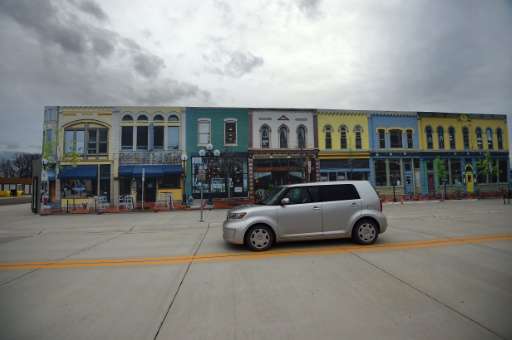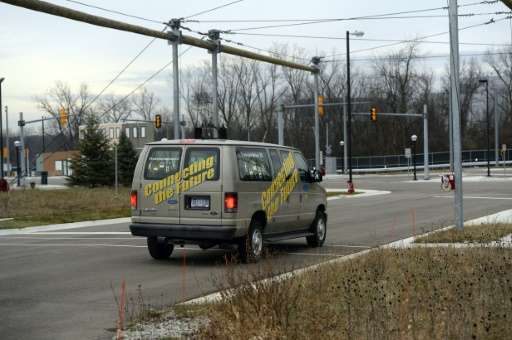Ghost town tests self-driving cars of tomorrow

Tucked away on a tree-lined US college campus, a sprawling ghost town has been built to test the self-driving cars of the future.
MCity, which sprung up in an empty field a year ago like a Hollywood set, is where new technologies which are already radically reshaping the automotive industry must prove themselves before they make it to regular roads.
The 13-hectare (32-acre) site offers all the trappings of urban life, designed to reproduce the kinds of situations a self-driving car would encounter, like a child dashing into the street after a ball.
Traffic signals, street lights, cross walks, bicycle lanes, roundabouts, a railroad crossing, even construction: nothing has been left out of MCity's design.
The Americana street names—Liberty Street, State Street, Main Street—and cheerful store fronts, bus stops, benches, mailboxes and garbage bins give MCity the appearance of a vibrant town.
But its cafes and restaurants are nothing but facades. Its inhabitants are a collection of data crunchers using cameras, radar, sonar and lasers.
For over a year, the faux town has served as a laboratory for testing the self-driving technologies of about a dozen companies, according to Jim Sayer, deployment director at the University of Michigan's Mobility Transformation Center in Ann Arbor, Michigan.

"Generally speaking they are testing software and sensors: how the system responds in very specific scenarios that they set up," Sayer told AFP.
The facility is able to set up a controlled experiment—for instance, how a tunnel or tree canopy might impact software. The test can be repeated time and time again while adjustments are made to sensors and software to improve performance.
Snow, night-driving tests
Automakers and technology companies developing autonomous driving systems can run their cars at up to 100 kilometers per hour (60 miles per hour) night or day in a variety of scenarios—city driving, country driving, highway driving—and on difference surfaces like gravel, asphalt and concrete.
Ford has tested its autonomous vehicles in MCity, which is just 60 kilometers from its Dearborn headquarters.
One part of its Fusion fleet will soon be tested there during extreme weather like snow and rainstorms, which can interfere with sensors and GPS.
"We've been testing (autonomous) cars in the real world, but using a place like MCity will allow us to refine our algorithms and better calibrate car sensors by repeating specific situations in a reliable way," said Jim McBride, who heads Ford's autonomous vehicle program.
For Sayer, the main value of MCity is the variety of tests that the site permits: each kilometer of the testing site can represent 100 or 1,000 kilometers of driving on real-world roads. And each scenario is infinitely repeatable, not possible on public roads.
MCity was created through a partnership between the university and Michigan's department of transportation. Corporate sponsors provided a million dollars in funding.
It isn't the only testing site of its kind: GoMentum in California has already welcomed test vehicles from Honda.
Sayer said self-drive technology is advancing to the point where autonomous vehicles could soon hit the streets in controlled situations like shuttles which drive people slowly around airports or college campuses.
"For vehicles that can replace the kind of vehicles we drive today operate in all weathers, in all speeds, all road conditions, it's probably another 20 years away before we reach something that is commercially viable," he said.
© 2016 AFP



















